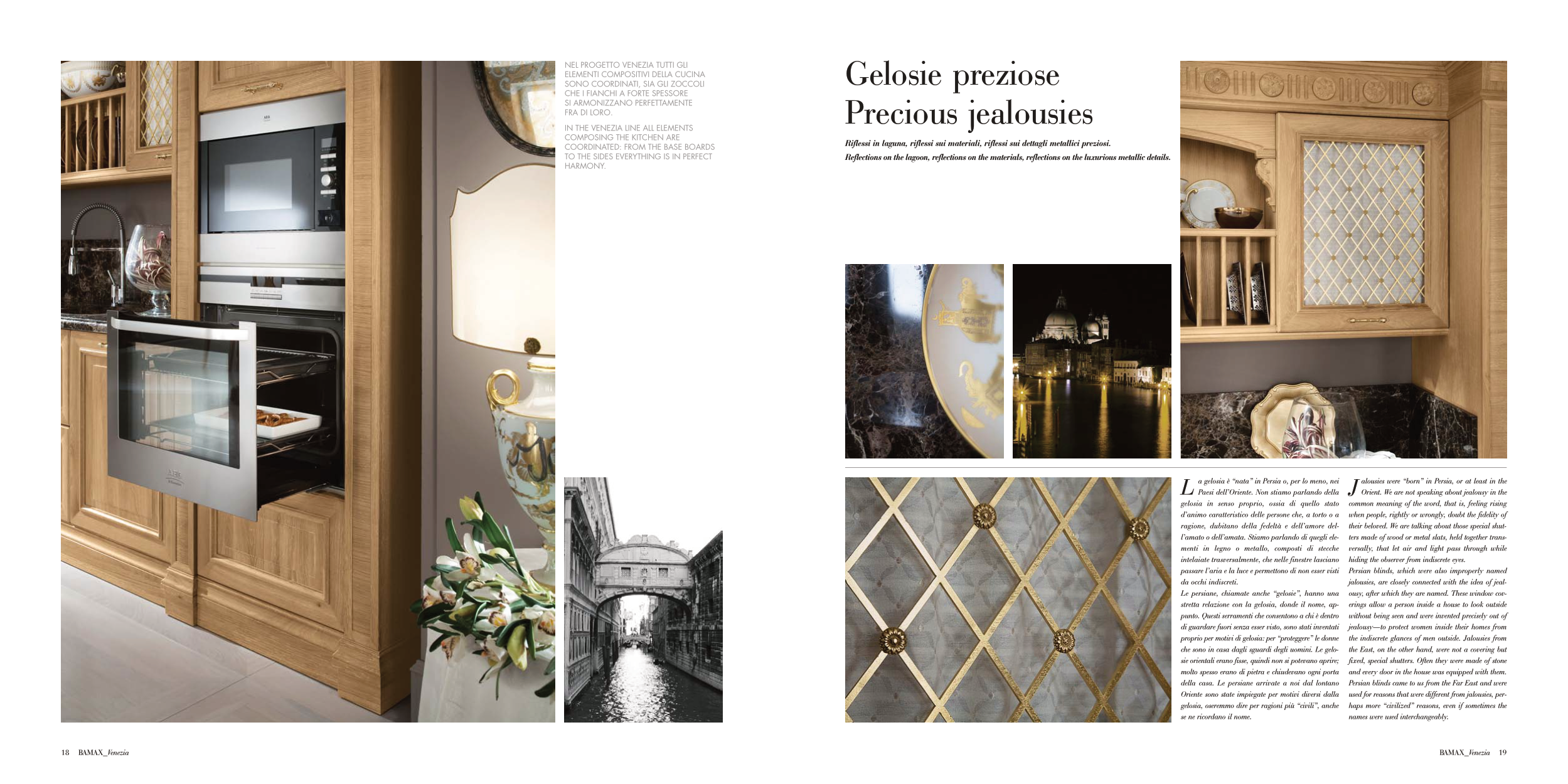18
BAMAX_Venezia
NEL PROGETTO VENEZIA TUTTI GLI
ELEMENTI COMPOSITIVI DELLA CUCINA
SONO COORDINATI, SIA GLI ZOCCOLI
CHE I FIANCHI A FORTE SPESSORE
SI ARMONIZZANO PERFETTAMENTE
FRA DI LORO.
IN THE VENEZIA LINE ALL ELEMENTS
COMPOSING THE KITCHEN ARE
COORDINATED: FROM THE BASE BOARDS
TO THE SIDES EVERYTHING IS IN PERFECT
HARMONY.
BAMAX_Venezia
19
Riflessi in laguna, riflessi sui materiali, riflessi sui dettagli metallici preziosi.
Reflections on the lagoon, reflections on the materials, reflections on the luxurious metallic details.
Gelosie preziose
Precious jealousies
L
a gelosia è “nata” in Persia o, per lo meno, nei
Paesi dell’Oriente. Non stiamo parlando della
gelosia in senso proprio, ossia di quello stato
d’animo caratteristico delle persone che, a torto o a
ragione, dubitano della fedeltà e dell’amore del-
l’amato o dell’amata. Stiamo parlando di quegli ele-
menti in legno o metallo, composti di stecche
intelaiate trasversalmente, che nelle finestre lasciano
passare l’aria e la luce e permettono di non esser visti
da occhi indiscreti.
Le persiane, chiamate anche “gelosie”, hanno una
stretta relazione con la gelosia, donde il nome, ap-
punto. Questi serramenti che consentono a chi è dentro
di guardare fuori senza esser visto, sono stati inventati
proprio per motivi di gelosia: per “proteggere” le donne
che sono in casa dagli sguardi degli uomini. Le gelo-
sie orientali erano fisse, quindi non si potevano aprire;
molto spesso erano di pietra e chiudevano ogni porta
della casa. Le persiane arrivate a noi dal lontano
Oriente sono state impiegate per motivi diversi dalla
gelosia, oseremmo dire per ragioni più “civili”, anche
se ne ricordano il nome.
J
alousies were “born” in Persia, or at least in the
Orient. We are not speaking about jealousy in the
common meaning of the word, that is, feeling rising
when people, rightly or wrongly, doubt the fidelity of
their beloved. We are talking about those special shut-
ters made of wood or metal slats, held together trans-
versally, that let air and light pass through while
hiding the observer from indiscrete eyes.
Persian blinds, which were also improperly named
jalousies, are closely connected with the idea of jeal-
ousy, after which they are named. These window cov-
erings allow a person inside a house to look outside
without being seen and were invented precisely out of
jealousy—to protect women inside their homes from
the indiscrete glances of men outside. Jalousies from
the East, on the other hand, were not a covering but
fixed, special shutters. Often they were made of stone
and every door in the house was equipped with them.
Persian blinds came to us from the Far East and were
used for reasons that were different from jalousies, per-
haps more “civilized” reasons, even if sometimes the
names were used interchangeably.


